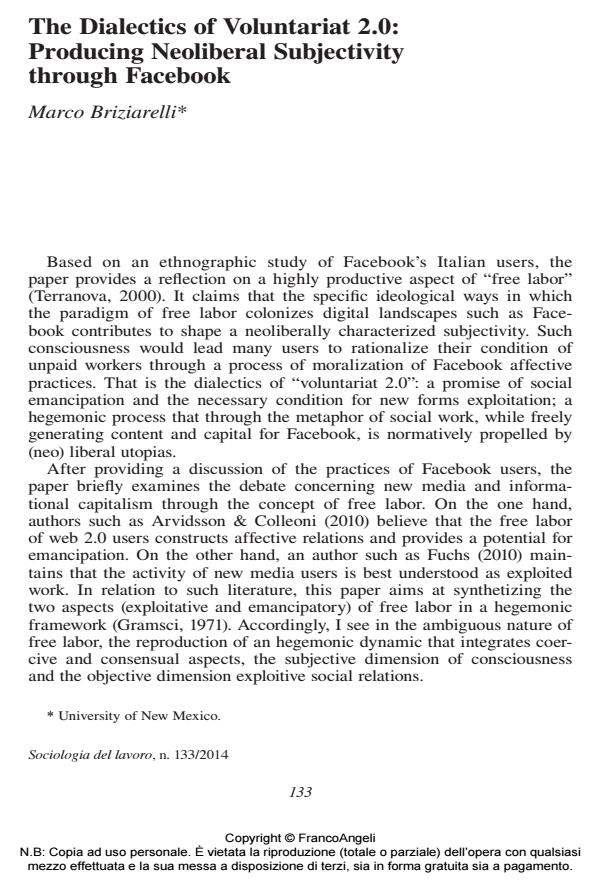The Dialectics of Voluntariat 2.0: Producing Neoliberal Subjectivity through Facebook
Titolo Rivista SOCIOLOGIA DEL LAVORO
Autori/Curatori Marco Briziarelli
Anno di pubblicazione 2014 Fascicolo 2014/133
Lingua Inglese Numero pagine 12 P. 133-144 Dimensione file 579 KB
DOI 10.3280/SL2014-133009
Il DOI è il codice a barre della proprietà intellettuale: per saperne di più
clicca qui
Qui sotto puoi vedere in anteprima la prima pagina di questo articolo.
Se questo articolo ti interessa, lo puoi acquistare (e scaricare in formato pdf) seguendo le facili indicazioni per acquistare il download credit. Acquista Download Credits per scaricare questo Articolo in formato PDF

FrancoAngeli è membro della Publishers International Linking Association, Inc (PILA)associazione indipendente e non profit per facilitare (attraverso i servizi tecnologici implementati da CrossRef.org) l’accesso degli studiosi ai contenuti digitali nelle pubblicazioni professionali e scientifiche
Basandosi sullo studio etnografico di utenti Italiani di Facebook, il presente saggio esamina un aspetto del lavoro gratuito particolarmente produttivo. L’autore descrive come tale tipo di lavoro colonizzi ideologicamente Facebook contribuendo così a creare una soggettività di stampo neoliberale. Tale coscienza porta molti utenti a razionalizzare la propria condizione precaria e non retribuita attraverso un processo di moralizzazione delle pratiche del social network. Questo processo viene definito come "la dialettica del volontariato 2.0". Essa promette l’emancipazione umana e allo stesso tempo produce le condizioni necessarie per il suo sfruttamento. Il così detto volontariato 2.0 viene descritto come una dinamica egemonica che usa la metafora del lavoro sociale la quale, mentre produce contenuto e capitale per Facebook, è mossa da utopie (neo-) liberali.
Parole chiave:Lavoro gratuito, Facebook, soggettività, egemonia, neoliberismo, stato sociale
- Informational cognitive exploitation: Concealed relationships behind prosumers' activity on World Wide Web Agostina Dolcemascolo, Guillermina Yansen, in SOCIOLOGIA DEL LAVORO 145/2017 pp.61
DOI: 10.3280/SL2017-145004 - Socio-Economic Development Marco Briziarelli, pp.817 (ISBN:9781522573111)
- Introduzione. Il lavoro gratuito. Genealogia ed esplorazione provvisoria del concetto Emiliana Armano, Marco Briziarelli, Federico Chicchi, Elisabetta Risi, in SOCIOLOGIA DEL LAVORO 145/2017 pp.7
DOI: 10.3280/SL2017-145001 - Precarity within the Digital Age Marco Briziarelli, Emiliana Armano, pp.81 (ISBN:978-3-658-17677-8)
- Promoting Social Change and Democracy through Information Technology Marco Briziarelli, pp.49 (ISBN:9781466685024)
- Media Controversy Marco Briziarelli, Eric Karikari, pp.1 (ISBN:9781522598695)
Marco Briziarelli, The Dialectics of Voluntariat 2.0: Producing Neoliberal Subjectivity through Facebook in "SOCIOLOGIA DEL LAVORO " 133/2014, pp 133-144, DOI: 10.3280/SL2014-133009